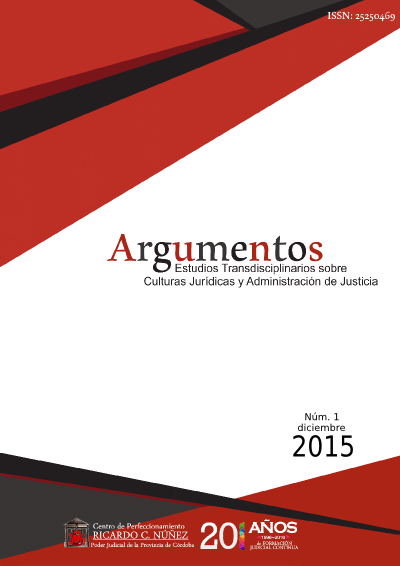Public Procedural, a path to social legitimacy
Keywords:
Judiciary, Media, Publicity, Transparency, LegitimacyAbstract
The judicial process as an act of republican government, should be public: that is, open to direct and indirect knowledge of the general public, unless it can be affected safeguarding personal or social goods that have to protect against publicity.
The advent of mass media and technology have changed the meaning of the trial publicity under various criminal procedure codes. The diffusion of a court made by the press contributes to form a social perception, then translated into public opinion on the functioning of Justice.
Now, it seems that in general, the judiciary -unlike other State powers whose representatives are elected through popularly vote- isn't much disturbed about being legitimized. The guiding principle of his actions has been the law: compliance and enforcement. But legitimacy is a transcending purpose. And public confidence in the system is achieved by opening up to society, informing and instructing the citizen, communicating with them, allowing them to appropriate the issues that affect them or may eventually do so.
It is an imperative of our time judiciaries design policies of institutional transparency so legality and legitimacy are able to walk in unison.
Downloads
References
Anitua, G. (2003) Justicia penal pública. Un estudio a partir del principio de publicidad de los juicios penales. Buenos Aires, Del Puerto.
Anitua, G. (2008) “Sobre el juicio por jurados en el año 2008”, Revista Argentina de Teoría Jurídica, nr 12.
Binder, A. (1977) Reforma de la Justicia penal y constitucional: del Programa Político al Programa Científico. Conferencia llevada a cabo en las Jornadas Internacionales sobre Enjuiciamiento Penal, Rosario, Argentina, Noviembre de 1977. Recuperado de http://www.cienciaspenales.org/REVISTA%2016/binder16.htm.
Bidart Campos, G. (2002) “Presunción de inocencia, derecho al honor, derecho a la información y libertad de prensa”, El Derecho, tomo 165.
Ferrajoli, L. (1995) Derecho y razón. Teoría del garantismo penal, Madrid, Trotta.
Frascaroli, M. S. (2004) Justicia Penal y Medios de Comunicación, Buenos Aires, Ad Hoc.
Garland, D. (1999) Castigo y sociedad moderna. Un estudio de teoría social, México, Siglo XXI.
Hendler, E. S. (1989) “Teatralidad y enjuiciamiento oral”, Revista Jurídica La Ley, Buenos Aires, 11 de mayo de 1989, Suplemento actualidad.
Maquiavelo, N. (2011) El Príncipe, Madrid, Tecnos.
Nino, C. S. (1992) Fundamentos de derecho constitucional, Buenos Aires, Astrea.
Noelle Newman, E. (1995) La espiral del silencio: opinión pública, nuestra piel social,
Barcelona, Paidós.
Nye, J. (1967) “Corruption and Political Development: a Cost-Benefit Analyisis”,
American Political Science Review, 51, pp. 417-429.
Pascal, B. (1940) Pensamientos, Madrid, Espasa Calpe. Recuperado de http://www.cervantesvirtual.com/obra/pensamientos--1/
Pertile, D. (2004). Prensa y Justicia. El Vocero Judicial para Cortes Supremas y Tribunales Superiores. Córdoba, Advocatus.
Rodríguez, E. (2000). Justicia mediática. La administración de justicia en los medios de comunicación. Las formas del espectáculo. Buenos Aires, AdHoc.
Rusche, G. y Kircheimer, O. (1984) Pena y Estructura social. Bogotá, Temis.
Zaffaroni, E., Aliaga y Slokar (2000) Derecho Penal. Parte General, Buenos Aires, Ediar.



